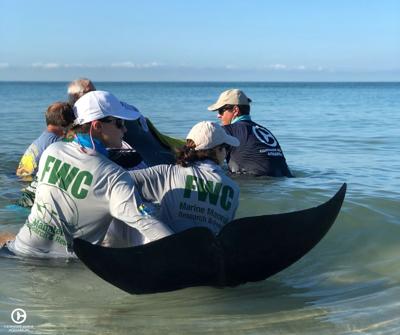REDINGTON BEACH — It’s something that residents rarely see — five short-finned pilot whales stranded several yards offshore.
Jessica Powell, a spokeswoman for National Oceanic and Atmospheric Administration Fisheries, said the first reports about the whales came in between 6 and 7 a.m. July 29 but officials hadn’t determined when they were stranded.
In the afternoon that day, after 10 hours of rescue efforts, three of the whales were taken to deeper waters and released — two with satellite tags — as they did not appear to have any medical issues, according to a Clearwater Marine Aquarium Facebook post.
The other two whales were taken to the aquarium’s rehabilitation facility and will ideally be released back with the others.
In the morning, NOAA, the aquarium, the Florida Fish and Wildlife Conservation Commission and other partners in the rescue efforts were working to keep the whales as comfortable as possible and assess their health.
Officials hadn’t determined why the whales were stranded.
“It’s really hard in these situations,” Powell said. “They are highly social species so there are number of reasons why these animals could have mass-stranded.”
The pilot whales are typically found about 100 miles offshore in groups of 10 to 100.
Hundreds of people on July 29 came to the beach area, about a half-mile south of 163rd Avenue, where agencies were attending to the whales about 30 to 40 feet offshore.
“We are very happy the way the community came together to bring out tents, and they are very organized — the rescue team — and we’re very impressed,” said Alyece Thompson, a Redington Beach resident.
“I’ve been here all my life and this is the first time I’ve seen this. I know it happens,” she said.
Mike Deakley said he has lived in Seminole for years, and the incident marks the first time he has seen a stranded whale.
“It’s kind of sad really,” he said.
Darbi Howard had similar remarks.
“You can tell they are sort of struggling,” she said. “They are keeping them cool and have tents over them.”
She stays at a house in Madeira Beach for a month every summer.
“It’s been happening a lot in California. A lot of beached whales,” she said. “They are washing up and seemingly shouldn’t be.”
Many streets in Redington Beach were lined with vehicles belonging to people wanting to see the whales.
Short-finned pilot whales prefer warmer tropical and temperate waters. They can be found at varying distances from shore, but typically prefer deeper waters, NOAA’s website says.
Pilot whales are often involved in mass strandings for reasons that are still unclear. Their diet consists primarily of squid, with a small amount of fish.
Anybody who comes across a stranded pilot whale should not try to push the whale out into deeper water.
“Those animals are typically sick, and the best thing you can do is call the stranded animal hotline, and we will have trained professionals come out and assess the situation and take care of these animals,” Powell said.
The hotline number is 410-576-3880.


















